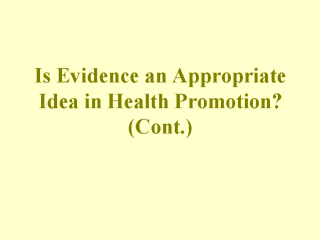| front |1 |2 |3 |4 |5 |6 |7 |8 |9 |10 |11 |12 |13 |14 |15 |16 |17 |18 |19 |20 |21 |22 |23 |24 |25 |26 |27 |28 |29 |review |
 |
- Or in other
words,according to them, "evidence" in health promotion is an inappropriate
idea, and perhaps we should just stop using the term - I have not done full justice to their argument, but I think I am not too far off the main point that they more eloquently make in the chapter in the WHO book on evaluation in health promotion - If so, the question then becomes do we agree with them? - I'm sure all of you have a view on the matter - My view is that while I agree with McQueen and Anderson in theory; in practice, it is not practical to adopt this position - As long as we require resources to do the kind of work that we value and think is important in health promotion, we cannot afford to ignore the views of those people who make the decisions to allocate or not allocate resources to health promotion - And at this point in time, as indicated by the WHO resoluation that I showed earlier, their language includes the notion of "evidence-based health promotion", whatever that might mean - So I think that unless we want to continue to make "stone soup without a pot", we better talk about "evidence-based health promotion" even if it means something different than many decision-makers think it does |
| front |1 |2 |3 |4 |5 |6 |7 |8 |9 |10 |11 |12 |13 |14 |15 |16 |17 |18 |19 |20 |21 |22 |23 |24 |25 |26 |27 |28 |29 |review |